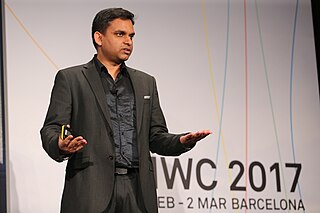
Darwinism is a term used to describe a theory of biological evolution developed by the English naturalist Charles Darwin (1809–1882) and others. The theory states that all species of organisms arise and develop through the natural selection of small, inherited variations that increase the individual's ability to compete, survive, and reproduce. Also called Darwinian theory, it originally included the broad concepts of transmutation of species or of evolution which gained general scientific acceptance after Darwin published On the Origin of Species in 1859, including concepts which predated Darwin's theories. English biologist Thomas Henry Huxley coined the term Darwinism in April 1860.
The Walter A. Haas School of Business is the business school of the University of California, Berkeley, a public research university in Berkeley, California. It was the first business school at a public university in the United States.

Michael Eugene Porter is an American businessman and professor at Harvard Business School. He was one of the founders of the consulting firm The Monitor Group and FSG, a social impact consultancy. He is credited with creating Porter's five forces analysis, which is instrumental in business strategy development at present. He is generally regarded as the father of the modern strategy field. He is also regarded as one of the world's most influential thinkers on management and competitiveness as well as one of the most influential business strategists. His work has been recognized by governments, non-governmental organizations and universities.

Harvard Business Review (HBR) is a general management magazine published by Harvard Business Publishing, a not-for-profit, independent corporation that is an affiliate of Harvard Business School. HBR is published six times a year and is headquartered in Brighton, Massachusetts.

Coimbatore Krishnarao Prahalad was an Indian-American entrepreneur and author.
Open innovation is a term used to promote an Information Age mindset toward innovation that runs counter to the secrecy and silo mentality of traditional corporate research labs. The benefits and driving forces behind increased openness have been noted and discussed as far back as the 1960s, especially as it pertains to interfirm cooperation in R&D. Use of the term 'open innovation' in reference to the increasing embrace of external cooperation in a complex world has been promoted in particular by Henry Chesbrough, adjunct professor and faculty director of the Center for Open Innovation of the Haas School of Business at the University of California, and Maire Tecnimont Chair of Open Innovation at Luiss.
Intrapreneurship is the act of behaving like an entrepreneur while working within a large organization. Intrapreneurship is known as the practice of a corporate management style that integrates risk-taking and innovation approaches, as well as the reward and motivational techniques, that are more traditionally thought of as being the province of entrepreneurship. Corporate entrepreneurship is a more general term referring to entrepreneurial actions taking place within an existing organization whereas Intrapreneurship refers to individual activities and behaviors.

David John Teece is a New Zealand-born US-based organizational economist and the Professor in Global Business and director of the Tusher Center for the Management of Intellectual Capital at the Walter A. Haas School of Business at the University of California, Berkeley.

Vijay Govindarajan, is the Coxe Distinguished Professor at Dartmouth College's Tuck School of Business and Marvin Bower Fellow, 2015–16 at Harvard Business School.

Henry William Chesbrough is an American organizational theorist, adjunct professor and the faculty director of the Garwood Center for Corporate Innovation at the Haas School of Business at the University of California, Berkeley and Maire Tecnimont Chair of Open Innovation at Luiss. He is known for coining the term open innovation.
The Arrow information paradox, and occasionally referred to as Arrow's disclosure paradox, named after Kenneth Arrow, American economist and joint winner of the Nobel Memorial Prize in Economics with John Hicks, is a problem faced by companies when managing intellectual property across their boundaries. It occurs when they seek external technologies for their business or external markets for their own technologies. It has implications for the value of technology and innovations as well as their development by more than one firm, and for the need for and limitations of patent protection.
The InnovationXchange, also known as IXC UK, is a Lincoln, UK-based open innovation services and consulting provider, whose purpose is to identify and create collaborative business, research and policy opportunities.
Corporate venture capital (CVC) is the investment of corporate funds directly in external startup companies. CVC is defined by the Business Dictionary as the "practice where a large firm takes an equity stake in a small but innovative or specialist firm, to which it may also provide management and marketing expertise; the objective is to gain a specific competitive advantage." Examples of CVCs include GV and Intel Capital.
Before being open, innovation happened in closed environments often performed by individuals, scientists or employees. However, the expression closed innovation was coined later and not before the paradigm of open innovation became popular by works of Henry Chesbrough and Don Tapscott et Anthony D. Williams
Navi Radjou is an Indian born scholar and an innovation and leadership advisor based in Silicon Valley. He is a Fellow of Judge Business School at the University of Cambridge and has spoken and written widely on the theme of frugal innovation.
Ludo Van der Heyden is an academic, management educator, and adviser. He is a professor at INSEAD, where he has served as co-Dean. He currently holds the INSEAD Chaired Professorship in Corporate Governance, and is a Fellow at CEDEP. His broad research interests are in fair process, leadership, and business model innovation. His teaching interests also include leadership and team dynamics, project management, and family business management.

Sangeet Paul Choudary is a business executive, advisor, and best-selling author. He is best known for his work on platform economics and network effects. He is the co-author of the international best-selling book Platform Revolution: How Networked Markets Are Transforming the Economy and How to Make Them Work for You.

Professor Xiaolan Fu is a British-based Chinese economist, and Fellow of the Academy of Social Sciences. She is the Founding Director of the Technology and Management Centre for Development (TMCD). She is a Professor of Technology and International Development and Fellow of Green Templeton College at the University of Oxford.
Sabine Brunswicker is a Full Professor for Digital Innovation at Purdue University, West Lafayette, United States, and the Founder and Director of Research Center for Open Digital Innovation (RCODI). She is a computational social scientist with a particular focus on open digital innovation who engages with an interdisciplinary group of researchers to predict individual and collective outcomes in open digital innovation. She has written numerous research papers and books chapters on Open Innovation, and is an internationally recognized authority in the field. She chaired the World Economic Forum workshop for a session titled "Open innovation as a driver of business and economic transformation" in 2014. She is known for pioneering Purdue IronHacks, an iterative hacking initiative (www.ironhacks.com) that encourages experiential learning at Purdue University.
Manav Subodh is an Indian social entrepreneur. He is the founder of 1M1B, a United Nations-accredited nonprofit organization. He is also one of the creators of 'Big on Small Talk' podcast.









